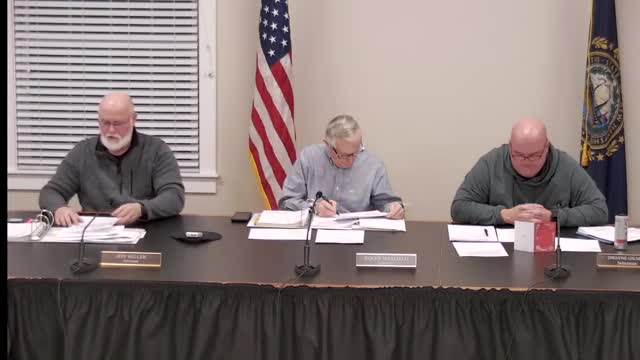Loudoun fire chief presses case for $1.7M ladder truck as bond hearing draws public scrutiny
Get AI-powered insights, summaries, and transcripts
Subscribe
Summary
At a Jan. 14 selectmen hearing, the town's fire chief outlined mechanical problems, repair costs and operational limits of the department's 20‑year‑old aerial truck and urged voters to approve a $1.7 million bond; after extended public comment the selectmen voted to table the bond hearing to Feb. 5 with a Feb. 6 snow date.
Loudoun — The town’s fire chief on Jan. 14 told the Board of Selectmen and more than two dozen residents that the department’s 2004 aerial device has exceeded recommended service life, is increasingly difficult and expensive to repair and cannot reliably reach many homes and commercial target hazards in Loudoun — and urged approval of a bond to buy a replacement ladder truck.
The chief described a vehicle with 48,206 miles and about 7,224 hours of use, repeated recent mechanical failures and more than $14,100 in repairs this year alone. He proposed using $400,000 from the fire apparatus capital reserve and bonding the balance, a package the department estimates at about $1.7 million and would amortize with a 10‑year municipal bond. The warrant article’s first annual debt service payment was listed during the hearing at $32,500 and the town projected an estimated tax impact starting near $0.25 per $1,000 of assessed value in the first year in published estimates for the bond scenario.
Why it matters: the chief said a new aerial device affects life‑safety tactics (rescues, ventilation, master stream operations) at large buildings and multi‑story homes and can change the town’s ISO/insurance classification. He also stressed long manufacturer lead times — two to three years from order to delivery — meaning voters’ choice now would not produce a truck immediately.
The case for replacement: the chief told the room the current truck often cannot access narrow, steep driveways or properties with landscaping and granite mailbox posts, limiting its practical usefulness. He explained tradeoffs between a tower (a ladder with a bucket) and a straight aerial ladder — towers cost substantially more — and that the department is not seeking a high‑end model but a vehicle “that will meet the needs of the town to accomplish life safety operations.” He also said parts availability for the aging apparatus is worsening and cited two recent out‑of‑service periods of three and eight weeks. “Finding parts for the truck at this point has become difficult, to say the least,” he said.
Staffing, pump and quint debate: the chief recommended buying an aerial ladder with a pump (a “quint”‑type capability) to increase flexibility given the town’s limited daytime staffing and the department’s mix of career and call personnel. Some residents questioned the added cost and weight of including a pump on the vehicle and whether that was necessary for Loudoun’s needs. Resident Rick Whitney said he opposed adding the pump portion and pressed for precise cost differentials; the chief replied the pump option added significantly less than some residents expected but that the figure varied by options and materials.
Mutual aid and the racetrack: the chief and residents discussed Loudoun’s long‑standing mutual‑aid relationships — notably with Concord — and the town’s historical connection to the nearby racetrack. Selectmen and residents reviewed planning‑board minutes from the late 1980s that describe a previous owner donating a used ladder truck as part of a negotiation over building height; however, the chief and others said those minutes do not show any ongoing requirement that later owners purchase additional apparatus. Several residents urged the board to approach the racetrack formally for financial help and suggested regional or multi‑town cost‑sharing as alternatives.
Cost uncertainty and timing: manufacturers told staff to expect price increases if the town waits, the chief said, and cited manufacturer estimates that a one‑year delay could increase a purchase price by roughly 14–16 percent (the chief used a 15% midpoint as an example). He reminded the public that even with a purchase vote, delivery would likely take two to three years. The department also noted near‑term maintenance costs (tires, inspections) the town will face if a vote is delayed.
Public response: residents raised questions about tax impacts, alternatives such as buying used apparatus, shared regional ownership, asking the racetrack to contribute, and whether the town could delay the purchase to pursue multi‑town agreements. Sean Kitson and other residents suggested pursuing regionalization or a formal cost‑share before asking local taxpayers to fund the full purchase. Others, including recreational and business stakeholders present, said larger commercial properties and events increase the town’s need for an aerial device.
Outcome and next steps: Selectmen moved to table the bond hearing so the town can pursue follow‑up meetings and outreach, including contacting the racetrack and neighboring communities. A motion to table the bond hearing until the board’s February 5, 2025 meeting (snow date Feb. 6) passed by voice vote; the board said it will invite the racetrack to meet before that hearing. The board and the chief reiterated that the amount quoted was an estimate, that part of the purchase would come from the town’s capital reserve fund, and that any final bond terms will be set if and when the warrant article is voted at town meeting.
Budget context: the bond hearing was held as part of a broader budget hearing on Jan. 14. Selectmen reported a proposed operating budget for fiscal 2025–26 and daily maintenance pressures across town departments; residents repeatedly referenced the town’s projected school costs and other pressures when arguing about tax sensitivity.
Ending: The fire chief said he would continue to provide technical details and answer questions, and the board scheduled additional outreach and a follow‑up hearing on Feb. 5 (Feb. 6 snow date). Voters at town meeting will decide whether to authorize the bond and appropriate the proposed funds for replacement apparatus.
